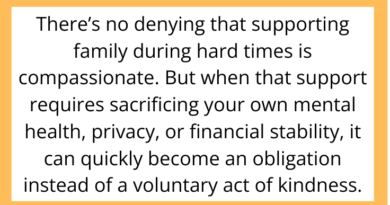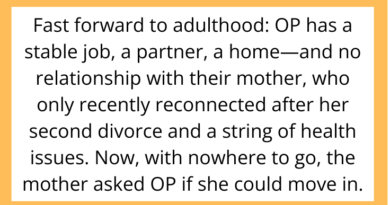AITAH for Asking My Best Friend to Pay Me Back Before Inviting Her to My Wedding?
When I saw this post on r/AITAH, I knew it would stir up controversy. The poster wondered if they were in the wrong for insisting their best friend pay back an old loan before they could formally invite her to their wedding. It’s a scenario that touches on financial boundaries, friendship loyalty, and the tricky question of whether money should ever factor into personal milestones.
Today, we’re going to break down this complicated situation, explore why opinions were so divided, and consider whether setting financial boundaries makes you the villain.
Let’s dive in.
The Story That Sparked the Debate

The original poster (OP) explained that five years ago, they loaned their best friend a significant sum—$3,000—to help cover emergency medical expenses. While the friend promised to pay it back within a year, the money never came, despite OP sending gentle reminders.
Fast forward to the present: OP was planning their wedding and needed every dollar to cover costs. They decided not to send a formal invitation to their friend until the debt was repaid. When the friend found out she wasn’t included in the initial guest list, she confronted OP, accusing them of holding money over her head and destroying their friendship out of greed.
OP argued that the issue wasn’t about punishment but about fairness—especially since they were still paying off credit card debt from the loan. But their other friends were divided: some agreed OP was justified, while others called the decision petty and vindictive.
Friendship and Money: A Volatile Mix

Why Borrowing From Friends Gets So Complicated
One of the reasons this scenario struck a nerve is that money and friendship rarely mix well. Lending a friend money can blur the lines between generosity and obligation.
Many readers empathized with OP, pointing out that a $3,000 debt is not insignificant and that it’s reasonable to expect repayment before funding a large celebration that the borrower would attend. They felt OP’s friend took advantage of their kindness and never made good on her word.
Others, however, believed that friendship should rise above financial transactions, and that weddings are about celebrating relationships, not settling scores.
Should Weddings Be Tied to Repayment?
Another dimension of the debate was whether it’s ever appropriate to connect an unpaid debt to a wedding invitation. OP insisted it was about principle, not revenge, but critics argued that withholding an invite turned the wedding into leverage—transforming a day of joy into a negotiation.
One commenter noted that while OP’s frustration was justified, weddings are often the moments when old grievances resurface and overshadow the real purpose: celebrating love.
Setting Boundaries Without Guilt

Healthy Ways to Address Debt in Relationships
Many people struggle with how to enforce financial boundaries without damaging friendships. In OP’s case, they’d spent years waiting for repayment and felt they had no other options left.
If you’re in a similar situation, consider these steps before taking action:
-
Communicate Clearly: Be upfront about expectations. If repayment is important to you, state it explicitly, without shame or resentment.
-
Offer a Payment Plan: Sometimes, friends want to pay you back but feel overwhelmed. A flexible timeline can reduce tension.
-
Separate Emotions From Logistics: Try to avoid tying repayment to life events like weddings or birthdays, which can feel punitive.
When It’s Time to Let Go
In some cases, you may never see your money again. That doesn’t mean you have to invite someone who caused you financial strain, but it does mean deciding whether the friendship still holds value beyond the debt.
For OP, the unresolved loan was a symbol of disrespect. For their friend, the unpaid debt was secondary to years of shared history.
The Community’s Verdict

The r/AITAH community was split. Roughly half felt OP had every right to expect repayment before spending money to host someone who hadn’t honored a commitment. Others thought using the wedding invite as leverage was a step too far and that OP should have either written off the loan or addressed the issue separately.
This scenario is a reminder that money has the power to complicate even the strongest relationships—and that clear communication is essential to prevent resentment from festering.
Final Thoughts: Are You the Bad Guy?

In the end, whether you’re the villain in this story depends on your values. If you believe that trust and fairness are foundational to any relationship, you may side with OP. If you feel that weddings should be about love, not accounting, you may empathize with the friend.
No matter where you land, it’s clear that the intersection of money and personal milestones is fraught—and that setting healthy boundaries doesn’t always make you the bad guy.



